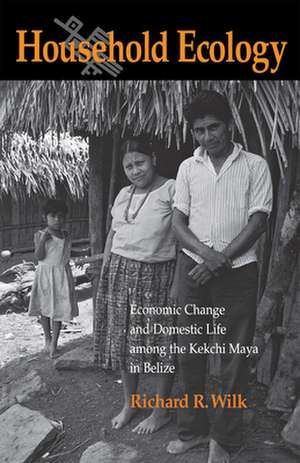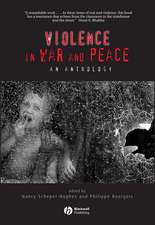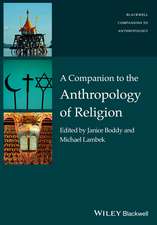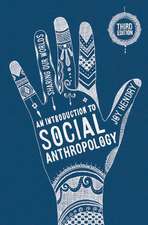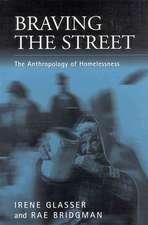Household Ecology: Economic Change and Domestic Life among the Kekchi Maya in Belize
Autor Richard R. Wilken Limba Engleză Paperback – 31 oct 1997
Development and economic change are often seen as destructive to the family and to other traditional forms of social organization. Wilk's study of household ecology reveals that the Kekchi Maya of Belize have responded by creating new forms of family organization, working together to face challenges posed by development. Not merely survivors of an ancient splendor, the Kekchi Maya build upon their rich heritage to approach such problems as ethnic strife and rainforest destruction as creative agents.
Wilk combines a wealth of detail on agricultural calendars, hunting practices, land tenure, and labor exchanges in a general interpretation of cultural and ecological transformation. He provides a comprehensive analysis of how tropical farmers survive in the difficult rainforest environment, tracing the ingenuity and adaptability of Mayan culture. Fully incorporating the historical context of ecological processes, he documents the importance of household organization in shaping the trajectory of ecological change and shows how delicate this adaptation can be. Analyzing household response to localized economic and ecological settings, Wilk argues that the transformation of the rural economy and of Mayan culture proceeds through the conjunction of global and local processes.
The Kekchi refuse to fit into the models of economic evolution set forth in existing scholarship. This sensitive and well-written study challenges current orthodoxies about economic and social change and suggests new approaches to rural development and household ecology.
Wilk combines a wealth of detail on agricultural calendars, hunting practices, land tenure, and labor exchanges in a general interpretation of cultural and ecological transformation. He provides a comprehensive analysis of how tropical farmers survive in the difficult rainforest environment, tracing the ingenuity and adaptability of Mayan culture. Fully incorporating the historical context of ecological processes, he documents the importance of household organization in shaping the trajectory of ecological change and shows how delicate this adaptation can be. Analyzing household response to localized economic and ecological settings, Wilk argues that the transformation of the rural economy and of Mayan culture proceeds through the conjunction of global and local processes.
The Kekchi refuse to fit into the models of economic evolution set forth in existing scholarship. This sensitive and well-written study challenges current orthodoxies about economic and social change and suggests new approaches to rural development and household ecology.
Preț: 126.22 lei
Nou
Puncte Express: 189
Preț estimativ în valută:
24.15€ • 25.28$ • 20.10£
24.15€ • 25.28$ • 20.10£
Carte disponibilă
Livrare economică 10-24 martie
Preluare comenzi: 021 569.72.76
Specificații
ISBN-13: 9780875805757
ISBN-10: 0875805752
Pagini: 312
Dimensiuni: 140 x 216 x 20 mm
Greutate: 0.48 kg
Ediția:1
Editura: Northern Illinois University Press
Colecția Northern Illinois University Press
ISBN-10: 0875805752
Pagini: 312
Dimensiuni: 140 x 216 x 20 mm
Greutate: 0.48 kg
Ediția:1
Editura: Northern Illinois University Press
Colecția Northern Illinois University Press
Recenzii
"A well-developed case study of households among the lowland Maya.... Takes one to the frontier of this subject."—American Anthropologist
"Challenges conventional images of traditional societies.... An excellent critique of recent theories of economic change in rural societies, well supported by high standards of ethnographic and historical research.... A first-rate study."—American Scientist
"A major step toward explaining how people participate in those processes of social and economic change that have been so dramatically shaping their world for almost five centuries."—Hispanic American Historical Review
"Challenges conventional images of traditional societies.... An excellent critique of recent theories of economic change in rural societies, well supported by high standards of ethnographic and historical research.... A first-rate study."—American Scientist
"A major step toward explaining how people participate in those processes of social and economic change that have been so dramatically shaping their world for almost five centuries."—Hispanic American Historical Review
Cuprins
Table of Contents
Preface to Paperback Edition
Preface to First Edition
1. Introduction
2. Households and Social Evolution
3. The Household as a Unit of Analysis
4. The Historical and Ethnographic Setting
5. The Physical Setting
6. Land Tenure and Crops
7. Domestic Animals, Hunting, and Gathering
8. Economic Change
9. The Organization of Labor
10. Households as Adaptive Groups
11. Household History and Ecology
Notes
Bibliography
Index
Preface to First Edition
1. Introduction
2. Households and Social Evolution
3. The Household as a Unit of Analysis
4. The Historical and Ethnographic Setting
5. The Physical Setting
6. Land Tenure and Crops
7. Domestic Animals, Hunting, and Gathering
8. Economic Change
9. The Organization of Labor
10. Households as Adaptive Groups
11. Household History and Ecology
Notes
Bibliography
Index
Notă biografică
Richard Wilk
Descriere
Development and economic change are often seen as destructive to the family and to other traditional forms of social organization. Wilk's study of household ecology reveals that the Kekchi Maya of Belize have responded by creating new forms of family organization, working together to face challenges posed by development. Not merely survivors of an ancient splendor, the Kekchi Maya build upon their rich heritage to approach such problems as ethnic strife and rainforest destruction as creative agents.
Wilk combines a wealth of detail on agricultural calendars, hunting practices, land tenure, and labor exchanges in a general interpretation of cultural and ecological transformation. He provides a comprehensive analysis of how tropical farmers survive in the difficult rainforest environment, tracing the ingenuity and adaptability of Mayan culture. Fully incorporating the historical context of ecological processes, he documents the importance of household organization in shaping the trajectory of ecological change and shows how delicate this adaptation can be. Analyzing household response to localized economic and ecological settings, Wilk argues that the transformation of the rural economy and of Mayan culture proceeds through the conjunction of global and local processes.
The Kekchi refuse to fit into the models of economic evolution set forth in existing scholarship. This sensitive and well-written study challenges current orthodoxies about economic and social change and suggests new approaches to rural development and household ecology.
Wilk combines a wealth of detail on agricultural calendars, hunting practices, land tenure, and labor exchanges in a general interpretation of cultural and ecological transformation. He provides a comprehensive analysis of how tropical farmers survive in the difficult rainforest environment, tracing the ingenuity and adaptability of Mayan culture. Fully incorporating the historical context of ecological processes, he documents the importance of household organization in shaping the trajectory of ecological change and shows how delicate this adaptation can be. Analyzing household response to localized economic and ecological settings, Wilk argues that the transformation of the rural economy and of Mayan culture proceeds through the conjunction of global and local processes.
The Kekchi refuse to fit into the models of economic evolution set forth in existing scholarship. This sensitive and well-written study challenges current orthodoxies about economic and social change and suggests new approaches to rural development and household ecology.
